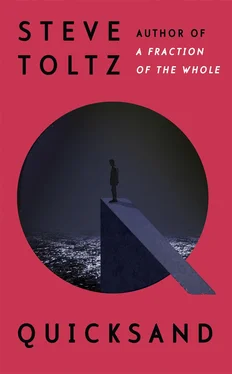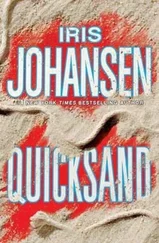The phone rang again. I answered it shouting, What? What? What is it?
— We saw your sign, the voice said. We need someone to come and fix a rat hole in the school hall, patch up some leaky pipes, paint over some graffiti, a janitor’s job basically.
— Where? I asked.
— At Zetland High.
My old high school, Your Honour! I burst into tears. And after weeks of nonstop no’s, I said yes, fuck it, why not?
III
The old high school was standing where it always had, between the shoe wholesaler with the blood-stained back staircase and the grocery store selling dust-covered chocolate bars. It was a daunting concrete structure set in a bland expanse of concrete, with concrete rails and concrete staircases and concrete floors, lit up by asymmetric beams of ghastly fluorescence. You couldn’t burn it down even if you wanted to.
I hopped over the low wire fence to cross the old quadrangle where dozens of festering pigeons still plagued the schoolyard like a Venetian piazza, where my good friend Liam and I used to try to out-obscene each other, and where Stella had once played a protest song for me, which I had discreetly viewed from the science lab. I spent a few minutes gazing into the same windows I’d spent years gazing out of, at the boys clawing at their ties in surly silence, and the girls so young and dazzling I had to neuter my male gaze. Then I went to work: fixed a couple of leaky pipes, dragged out the dead rats and stuffed them in garbage bags, nailed wooden planks over their escape hatch, cartoonishly hammered my thumb, sent the tools falling down the staircase, ran after them as children made disparaging comments I needed an urban dictionary to understand. Yet my overwhelming emotions were regret — that I didn’t enjoy my youth more — and compound loss; I was nostalgic both for my childhood and for the days, in my late twenties, when I was first nostalgic for my childhood.
I grabbed a sandwich from the cafeteria, then roamed corridors that didn’t smell of books or pencil shavings, but of the inside of an air-conditioning unit, and then for old time’s sake moved into the vestibule for the headmaster’s office, an austere area with a single fern and wooden benches where I used to sit and imagine I’d been shipwrecked and washed up alone in the lobby of an off-season hotel. It was at that moment, Your Honour, that I overheard three teachers inside the office discussing the objects that got thrown at them in the course of a normal school year — chalk dusters, apple cores, chairs — and one of them asking if either of the other two had ever been tempted to sleep with a student. No way! they shouted in scandalised tones, then after a moment of silence, exploded into the most sinister laughter I’d ever heard.
— You go first, one said.
— No, you.
Low voices followed, though from my covert position outside the office, the substance of their conversation eluded me; I caught only a name ( Mimi ) mentioned several times, accompanied by more black laughter. Then footsteps on carpet, and a door swinging open to reveal the teachers: two men and a heavy-set woman.
— What are you doing here? the woman asked, in a mannish voice.
I said that I was closing up the rat hole in the floorboards in the school hall.
— That was this morning, one of the men barked. What are you still doing here?
I would have thought that the universal pastime of eavesdropping needed no introduction, but there you are. I explained that I’d had lunch in the cafeteria.
— You know what, Mr Benjamin? That’s not OK.
All three teachers lectured me on the inappropriateness of a forty-year-old man — I was thirty-nine, but I let it go — with no business in a high school, lingering in the hallways. I thought: Surely a creature who excites faculty members of both genders is at least worth a look-see. I made my apologies, and promising to leave the grounds at once, went straight out to the concrete quadrangle to interrogate the students. I crouched in an alcove underneath a staircase that smelled so bad someone must have pissed on it when the cement was still wet. There I asked boys who couldn’t write their names without a spell-check if they knew this infamous Mimi. No luck. I asked girls who’d over-plucked their eyebrows so that they resembled the scary dolls they cradled as toddlers. Nada. I took a long, hard look at their faces and tried to guess how many would end up sleeping on the streets. Frankly, I couldn’t wait for their twenty-year high school reunion so I could turn up out of nowhere and rub it in their craggy, homeless faces.
It was then , Your Honour, that I heard a familiar voice.
— Don’t feed the pigeons, Donaldson!
IV
It was inconceivable that Mr Morrell was still forbidding students to feed the pigeons. I edged forward to get a good look at my old art teacher. He was still tall and sinewy, and his over-tanned skin still made him look like he’d been dragged out of the wreckage of a collapsed sunbed, and he was still peeling a mandarin.
— Jesus Christ, Mr Morrell!
Morrell turned around and peered intensely at me, his former student.
— That isn’t Aldo Francis Benjamin, surely.
— I’m afraid so.
He moved close enough to pat my pot belly.
— The good life, eh?
— What do you think I am, a sixteenth-century nobleman? This here’s mostly glucose and saturated fats.
Morrell laughed and gripped my arm in a way he wouldn’t have dared when I was a student.
— What are you doing here?
— Some odds and ends. Rat hole needed fixing. A little plumbing.
Morrell blinked, uncomprehending.
— But you haven’t come here to your old high school as a janitor, have you? Oh Lord in heaven, that’s grim. When I didn’t say anything, he said, In every moment of our lives, we always choose the least worst option, so for you to be here today, there must have been something terrible waiting for you elsewhere that you were eager to avoid.
I remembered now his penetrating way of burrowing in, and how he could demolish a student with a cutting remark, how he enjoyed understanding and interpreting behaviour then sadistically enlightening said person to that behaviour. It was due to him, I suddenly realised, that I had first taken an interest in amateur psychoanalysis as a lethal weapon, and began to listen actively to people’s stories and learned to hear the words they didn’t say more clearly than the words they did. Morrell’s eyes turned to a student giving pigeons mixed messages: scattering breadcrumbs on the ground then stomping his feet.
— This generation is the absolute worst one yet, Morrell said.
— You used to say that every year.
— It’s true every year, he replied, and rubbed his hand over his head as if in hope his baldness was a temporary mistake. He asked me how old I was and I told him I was nearly forty, and he seemed to think that reflected badly on his own lifespan.
— Children?
— At what age does one become childless anyway? My whole life I’ve been childless, but now, suddenly, it’s official?
Morrell stared at me in astonishment.
— Listen, Aldo. Do you mind if I point you out to a few students as a possible worst-case scenario?
Typical Morrell zinger. I actually didn’t mind. Nevertheless, for good sport I felt I must retaliate, so I asked the obvious question, which was why was he still moping around this tragic place when he always said he was going to dedicate the last half of his life to his art.
— I’ll be retiring soon to concentrate on my painting.
— Ah.
We both remembered him saying the same thing twenty years before. Now the curtain of sadness had fallen on us both. I had never seen the fear of one’s illegitimacy so pronounced on a human face.
Читать дальше











